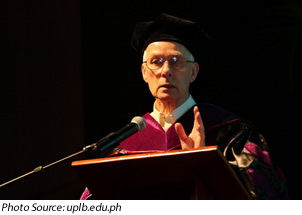
Nobel Laureate Rallies Global Support in Favor of GMOs
November 28, 2018| |
 The Los Baños scientific community came out in full force to welcome Sir Richard J. Roberts, Nobel Laureate in Physiology or Medicine, at his recent conferment of the Degree of Doctor of Laws, Honoris Causa, by the University of the Philippines (UP) for his contributions in the field of molecular biology on November 21, 2018 at UP Los Baños in Laguna, Philippines.
The Los Baños scientific community came out in full force to welcome Sir Richard J. Roberts, Nobel Laureate in Physiology or Medicine, at his recent conferment of the Degree of Doctor of Laws, Honoris Causa, by the University of the Philippines (UP) for his contributions in the field of molecular biology on November 21, 2018 at UP Los Baños in Laguna, Philippines.
Sir Richard Roberts is best known for his discovery of split genes, RNA splicing, and his contributions to the wide availability of restriction enzymes. His discovery of the split gene structure, and consequently, the understanding of RNA splicing, has become one of the basic knowledge of molecular biology today, while restriction enzymes have become vital tools in all molecular biology laboratories. Essentially, the practical applications of Roberts' discovery completely altered the course of genetic research and led to momentous developments in different fields including medicine.
He is likewise a fervent advocate of genetically modified organisms (GMOs) and led recent efforts urging Greenpeace and other anti-GMO groups to cease their campaign against GMOs. He articulated to religious, government leaders, academics and the general public how GMO works to improve productivity and nutrition. Using the Nobel Prize platform, he persuaded 138 other Nobel Laureates to support the safe and responsible use of recombinant technology as a tool for improving plant varieties.
In his address and lecture during the conferment ceremony, he spoke at length about the potential of GMOs to address food security and malnutrition especially in developing countries as well as the role of each sector in promoting the safety of genetically engineered crops. "We need more science in politics and less politics in science. Politicians must listen to the scientists they fund. [We should] stop supporting the idea that food produced by GMO methods must be inherently dangerous when science shows that they are not," he stated.
For more updates about biotech in the Philippines, visit the SEARCA BIC website.
| |
Biotech Updates is a weekly newsletter of ISAAA, a not-for-profit organization. It is distributed for free to over 22,000 subscribers worldwide to inform them about the key developments in biosciences, especially in biotechnology. Your support will help us in our mission to feed the world with knowledge. You can help by donating as little as $10.
-
See more articles:
-
News from Around the World
- Biotech Law Will Be Passed Soon in Uganda, S&T Chairperson Assures Farmers
- Study Shows Plant Characteristics Shaped by Parental Conflict
- Citizen Science Can Play A Role in Addressing Agricultural Challenges
- Argentina One Step Away from GM Wheat Commercialization
- Men More Positive about GM Foods, Survey Says
- Australian OGTR Approves Field Trial of GM Canola
- Study Shows Positive Impact of Bt Cotton Adoption Among Farmers in Pakistan
- Nobel Laureate Rallies Global Support in Favor of GMOs
- Report: Pakistan Achieves Biotech All-Time High in 2017
-
Research Highlights
- Gene Improves Heat and Drought Tolerance in Wheat and Arabidopsis
- Cotton Gene Enhances Brown Fiber Quality
- Development of 3rd Generation Climate Resilient and Dry Direct Seeded Rice Varieties
-
Beyond Crop Biotech
- Research Reveals How Ancient Viruses Got Cannabis High
-
Resources
- Map Shows Public Sector Biotech Products in the Pipeline Around the World
-
Plant
- CRISPR-Cas9 Delivered in Wheat Using Agrobacterium
- Screening for CRISPR and TALENs Edits, Better with Ribonucleoproteins
- CRISPR-Cas12a Applied in Rice
- Researchers Use CRISPR-Cas9 to Target Ripening Genes in Tomato
-
Read the latest: - Biotech Updates (November 26, 2025)
- Gene Editing Supplement (November 26, 2025)
- Gene Drive Supplement (February 22, 2023)
-
Subscribe to BU: - Share
- Tweet
